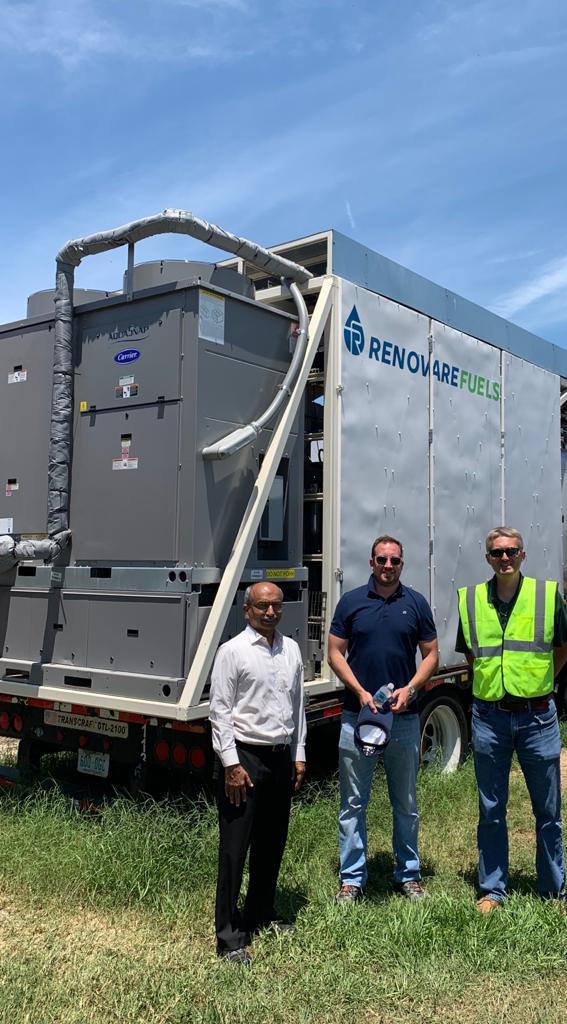The world has been in the grip of the COVID-19 pandemic for
more than half a year so far. As things stand there is no vaccine available,
and nobody knows when the pandemic will end. The effects have been dramatic and
widespread, affecting almost every area of society. Businesses have had to
close, either temporarily or permanently. Unemployment rates have soared, and
people have been forced to remain in their homes – some working from home, some
on furlough, and some out of work completely.
The economy looks to be headed for a huge global recession
which will have repercussions
that could last for decades. However, one positive result of the global
lockdown is that carbon emission rates have decreased significantly, as travel
has been highly restricted. As lockdown measures begin to ease, these emissions
are steadily rising once again.
Duncan
Clark, Renovare Fuels’ Business Development Director, is part of an
industry calling for measures to be implemented to maintain reduced carbon
emissions as the world emerges from lockdown.
Drop in Annual
Emissions
Even with carbon emissions gradually rising, the
decline during lockdown has led the International Energy Agency to forecast
an annual drop of 8% throughout 2020. Many countries experienced a decrease in
carbon emissions of almost 25% at the peak of the lockdown period, which
occurred throughout March 2020.
In the UK, emission levels decreased by 31%, a fall of
almost a third. However, by June, as measures were eased and more people began
to commute and use transport again, emissions were only 5% lower than the same
month in 2019.
Many industry experts are now calling for the introduction
of new green technologies to retain the decreased levels of emissions and
reduce them further, even as transport becomes more of a necessity.
A Defining Moment
in the Fight Against Climate Change
The Committee on Climate Change has declared the COVID-19
outbreak as a defining moment in the fight against climate change, urging UK
ministers to implement strategies to initiate a green recovery.
The current situation has been called a once-in-a-lifetime
opportunity to address climate change and make the transition to a low-carbon
economy on a global scale. Priorities outlined in the CCC report to Parliament
include developing buildings that are sustainable and fit for the future, and
implementing low-carbon retrofitting wherever possible.
Investment in green infrastructure, the restoration of
peatland and tree planting are essential for a low-carbon future, as is the
strengthening of the energy networks to support electrification of heating and
transport. Infrastructure needs to be designed to promote green modes of
transport including walking and cycling to work, and a circular economy must be
pursued.
Introducing New
Technologies
There are several new technologies available that will –
should they be properly implemented – play a key role in creating a greener,
more carbon-neutral future. CCS, or carbon capture and storage, can help
prevent carbon emissions from being released into the atmosphere by capturing
carbon dioxide and compressing it into a liquid form. This can then be used to
refill reservoirs of gas and oil that have been depleted or utilised in various
industrial processes.
EfW, or energy from waste, refers to numerous technologies
that have been introduced to the market that can take waste products from
biodegradable sources and turn them into new sources of energy, primarily heat
and electricity. Renovare Fuels has developed a patented system for converting
biogas from the organic waste from homes and industry into petrol, diesel or
jet fuel. The fuel produced requires no engine modifications at all and has the
potential to drastically reduce the environmental impact of transport.
About Renovare
Fuels
Matthew
Stone, Chairman of Renovare Fuels, is an expert in clean technologies.
Stone has direct experience in the field of commercialising and integrating
technologies on an international scale, working with a highly experienced team to
design, manufacture and market new technologies for the creation of liquid
vehicle fuels from biogas.
Renovare Fuels has the technology to produce biogas from
various waste sources, including sewerage treatment facilities, anaerobic
digesters and landfill sites.



 Bitcoin
Bitcoin  Ethereum
Ethereum  Tether
Tether  XRP
XRP  Solana
Solana  USDC
USDC  TRON
TRON  Cardano
Cardano  Lido Staked Ether
Lido Staked Ether  Avalanche
Avalanche  Toncoin
Toncoin